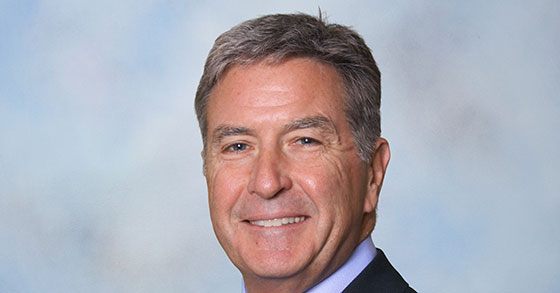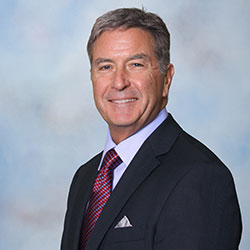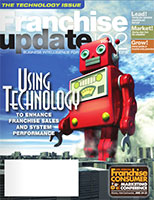Lifelong Learner: Leading by Example at Goddard Systems

 Joseph Schumacher, CEO of Goddard Systems and its 410 locations, traces his franchising career back to 1977 at Maaco. Founded by his brother-in-law Tony Martino (recently inducted into the IFA's Hall of Fame), Maaco was a good fit for Schumacher, who was making a good living and enjoying the work. A few years into it, Schumacher noticed that certain legal ramifications could determine system and franchisee success or failure and made a career-changing decision: while still working at Maaco corporate, he began attending law school at night.
Joseph Schumacher, CEO of Goddard Systems and its 410 locations, traces his franchising career back to 1977 at Maaco. Founded by his brother-in-law Tony Martino (recently inducted into the IFA's Hall of Fame), Maaco was a good fit for Schumacher, who was making a good living and enjoying the work. A few years into it, Schumacher noticed that certain legal ramifications could determine system and franchisee success or failure and made a career-changing decision: while still working at Maaco corporate, he began attending law school at night.
"My last few years at Maaco I was director of legal administration," says the 59-year-old. "It was a great role, and I enjoyed it so much that I left the brand to go into private law practice, where I provided outside counsel to Maaco and other franchise brands."
He spent the next two decades working with brands including McDonald's, Auntie Anne's, GNC, and numerous start-ups, gaining experience in all aspects of franchising and distribution, including the creation and growth of franchise programs, transactional and regulatory matters, day-to-day business consulting, and litigation and arbitration.
One of Schumacher's clients was the The Goddard School, a childcare and preschool franchise that had begun franchising in 1988 under Tony Martino's leadership. In 1992, Schumacher's brother Phil became CEO at Goddard and grew the brand over the next decade. In 2002, Goddard was sold to private investor Wind River Holdings.
After 20 years as outside counsel for Goddard, Schumacher left his law practice behind to join his brother, and in 2007 became COO. His legal career had provided him with a wealth of information that would come in handy in his new position. He understood franchisee relations and support, operations, quality assurance, advertising and marketing, human resources, accounting, and legal. When his brother retired in 2009, Schumacher took over as CEO. He says his background gives him a unique perspective.
"Everyone in the franchise system has to work together to make things successful," he says. "Often it can just be little things that get in the way and, if allowed to fester, can wreak havoc."
Since 2009, he has assembled a great corporate team. One part focuses on education, curriculum, and measurement under the vice president of education, a new position added last year; another is focused on franchisee support under the direction of the vice president of operations; and both are supported by the company's vice president of marketing. "It's important to support our franchisees and the educators who work with them," says Schumacher.
Today, he says, the brand has a very active and healthy working relationship with its franchisees. "We're very transparent at Goddard. We want our franchisees to be involved in the processes and to play a role in what goes on here."
For example, he points to Goddard Systems University, an internal training facility for school faculty and directors. "There should be reasonable expectations on both sides, and we strive to create that kind of environment," he says.
The company has been growing at a good clip in the past couple of years, with more growth ahead. "I expect we'll open another 18 units this year, but it's never growth for growth's sake," says Schumacher. "We want to continue to refine our educational programming, build an adequate infrastructure at home to support our growth, and, of course, help our franchise operators be successful."
Name: Joseph Schumacher
Title: CEO
Company: Goddard Systems, Inc.
Units: 410
Age: 59
Family: Two adult daughters, Kimberly and Courtney
Years in franchising: 35-plus
Years in current position: 5
Leadership
What is your role as CEO?
To set the mission for our company, to keep all stakeholders focused on our strategic plan, and to drive the mission through our teams. Goddard Schools are fully integrated, educational facilities designed to inspire children to learn and grow through play. Our mission is to provide leading-edge tools, service, and quality assurance for our franchisees to ensure that we deliver the highest quality preschool and childcare experience available anywhere. As CEO, I ensure that all of our projects are designed to achieve the mission and that all employees know that our franchisees' success is directly responsible for our success.
Describe your leadership style.
My leadership style has always been based fundamentally on the talents of the people around me. I work very hard to select bright people with new ideas and a passion for helping our franchisees succeed. I try to lead by example, especially in situations that involve our franchisees. A good leader allows their team enough freedom to help them shine and then ensures that they receive credit for all they do. It's a virtuous cycle that has worked for me since my very first management position.
What has inspired your leadership style?
An eclectic mix of lessons learned, from being mentored as a young manager by Tony Martino and others to watching how the folks at our parent company, Wind River Holdings, approach strategic issues today. I try to use everything that happens, good and not so good, as an opportunity to learn and grow. But my biggest inspiration has always been the people with whom I work.
What is your biggest leadership challenge?
Keeping all stakeholders focused on our strategic goals. There are always a lot of interesting things that come up in a given year, and it takes discipline to stay focused.
How do you transmit your culture from your office to front-line employees?
We work very hard at making sure that we communicate on a regular basis. We have a significant number of people who work in the field, and their roles and job satisfaction are very important to our success. I have learned, and continue to learn, that keeping people informed of the company's goals, progress, and pitfalls is essential. Just as essential is being open to feedback on any issue presented. Our people are very passionate about the assistance we provide to franchisees and the programs they deliver to families. It's important to harness that passion. We employ a number of different communication tactics, but the strategic goal of communication and engagement is paramount.
Where is the best place to prepare for leadership: an MBA school or OTJ?
While I think education is very important, education can only prepare a person to begin to learn by doing. Being in the fray is where the true lessons are learned. I've known highly educated people who just couldn't seem to be productive on the job. So I think education is critical, and I look for it, but a practical sense of how to get things done while working with others is what defines success. Someone who does not have an MBA, but who can do these things is, in my mind, just as qualified as the MBA--sometimes more.
Are tough decisions best taken by one person? How do you make tough decisions?
When you hire really good, thoughtful people, the informed dialogue among the team points the way to the correct decision the vast majority of the time. In situations where that has not been the case, I will make the call based on the information I have at the time and input from my people. To me, that's the ultimate job of the head of the company: to guide thoughtful discussion and to make those tough calls. And then you have to move on.
Do you want to be liked or respected?
I don't think the two are mutually exclusive, but my job is to help our company succeed through the good work of our franchisees and our team at GSI. We maintain a very collegial atmosphere at work. I like to say we take our work very seriously but we're not solemn about it. Intellectual curiosity and fun at work are critical to success. In the end, however, delivering extraordinary service to our franchisees is an absolute requirement. So my likability is really not factored into the analysis.
Advice to CEO wannabes:
Know what you're good at and what you're not good at. Develop your ability to recognize complementary strengths in other people who challenge you or make you think. Leverage strengths and conflicting positions for the good of your department or company. Look for people smarter than you are, and once they've demonstrated they have the right intentions and the right tools to do the job, give them the freedom to do it. Your ability to draw talent together for the common good will define your leadership.
Management
Describe your management style:
I try to be very open and collaborative. I look to surround myself with bright, passionate people and give them the freedom to do their jobs. I'm not big on formal meetings, although I recognize the necessity for them in a company like ours. But my preference is to walk around and talk to people. That's generally where I learn the most. Accountability is also important. If you're giving someone the freedom to do a job, you have to ensure that they are; and if they're off course, corrections need to be made. I find that good people generally want to be accountable anyway. It's also very important to give credit where it's due and celebrate the accomplishments of each person.
What does your management team look like?
CFO, vice president of operations, vice president of education, and vice president of advertising, marketing, and public relations. All are very smart, very strong, and very dedicated to the success of our franchisees.
How does your management team help you lead?
We have a very collaborative team, and while each person has their own specific area of responsibility, all are also involved in the management of the company. We meet at least weekly as a group and more often as situations arise. They are all smart, capable people who are truly collaborative with me, with one another, with other employees and, very importantly, with our franchisees.
Favorite management gurus: Do you read management books?
Malcolm Gladwell, Marshall Goldsmith, Steven D. Levitt. I read some management books, but prefer those with a different approach, like pretty much anything by the gurus I've named.
What makes you say, "Yes, now that's why I do what I do!"?
Presenting the annual Anthony A. Martino Memorial Scholarship to a high school senior who has graduated from The Goddard School pre-K or kindergarten program and is going on to college.
Personal
What time do you like to be at your desk? Exercise in the morning? Wine with lunch?
I exercise every morning, usually arrive at about 9, seldom go out for lunch, and don't drink when I do.
Do you socialize with your team after work/outside the office?
I frequently have after-hours conversations with members of my team in the office. These conversations tend to mix business and social topics.
Last two books read:
Savage Continent by Keith Lowe; The Heart of Everything That Is by Bob Drury and Tom Clavin.
What technology do you take on the road?
Cell phone, iPad, iPod, Lenovo Ultrabook.
How do you relax/balance life and work?
Lots of exercise, have fun at work, draw boundaries between work/life and respect them, a very supportive girlfriend.
Favorite vacation destination:
Any place with a beach.
Favorite occasions to send employees notes:
Whenever the opportunity arises.
Favorite company product/service:
The best, developmentally appropriate education that makes learning fun for preschoolers.
Bottom Line
What are your long-term goals for the company?
Continual improvement as a franchisor, reasonable and responsible growth, and continued and evolving educational excellence in our schools.
How has the economy changed your goals for your company?
We definitely scaled back our development goals during the economic downturn. But we always want the right franchisee in the right location. We've become more focused on our educational programming because competition in our sector has grown.
Where can capital be found these days?
We have an affiliate bank, Conestoga Bank. We also work with Franchise America Finance, Wells Fargo, BBVA, TD Bank, and Loans for Business (a loan broker that works with TD Bank and Stearns Bank).
How do you measure success?
On if we've achieved our goals as a company in an ethical, transparent manner and in the balanced best interests of all stakeholders, including our franchisees, employees, and ownership, Wind River Holdings.
What has been your greatest success?
Helping to raise my two daughters, Kimberly and Courtney, to become happy, healthy, productive adults.
Any regrets? None yet.
What can we expect from your company in the next 12 to 18 months?
About 20 new Goddard Schools, continued evolution of our educational and franchisee support, and continued dedication to excellence.
Share this Feature
Recommended Reading:
FRANCHISE TOPICS
- Multi-Unit Franchising
- Get Started in Franchising
- Franchise Growth
- Franchise Operations
- Open New Units
- Franchise Leadership
- Franchise Marketing
- Technology
- Franchise Law
- Franchise Awards
- Franchise Rankings
- Franchise Trends
- Franchise Development
- Featured Franchise Stories
FEATURED IN

Franchise Update Magazine: Issue 2, 2014








 The franchise listed above are not related to or endorsed by Franchise Update or Franchise Update Media Group. We are not engaged in, supporting, or endorsing any specific franchise, business opportunity, company or individual. No statement in this site is to be construed as a recommendation. We encourage prospective franchise buyers to perform extensive due diligence when considering a franchise opportunity.
The franchise listed above are not related to or endorsed by Franchise Update or Franchise Update Media Group. We are not engaged in, supporting, or endorsing any specific franchise, business opportunity, company or individual. No statement in this site is to be construed as a recommendation. We encourage prospective franchise buyers to perform extensive due diligence when considering a franchise opportunity.